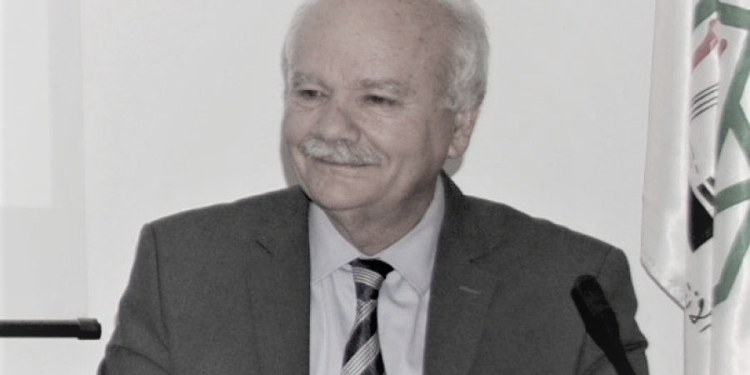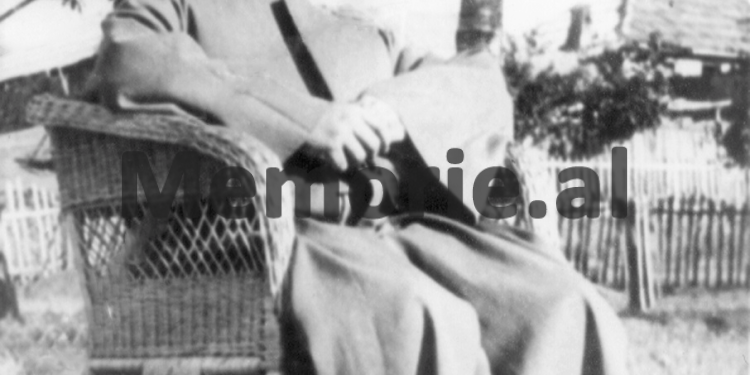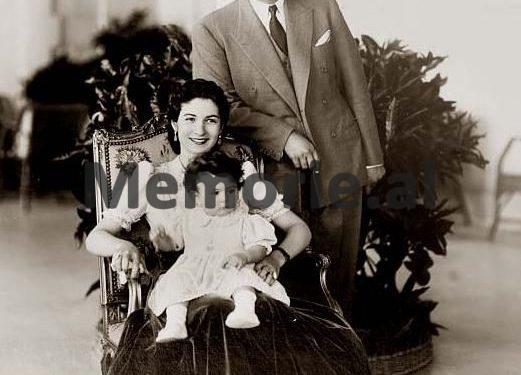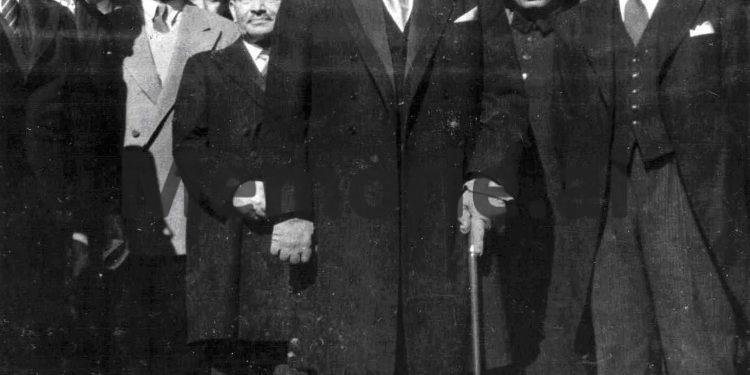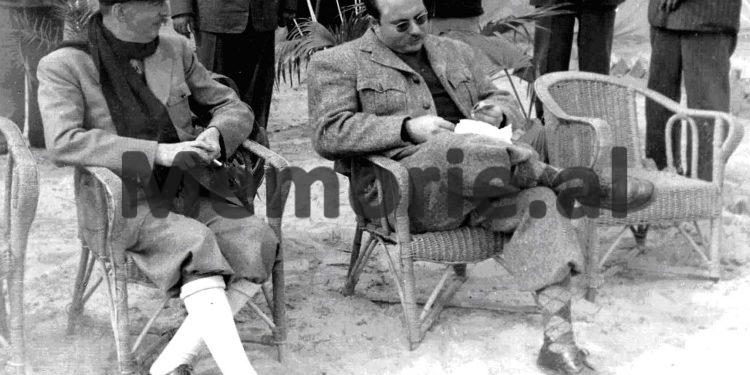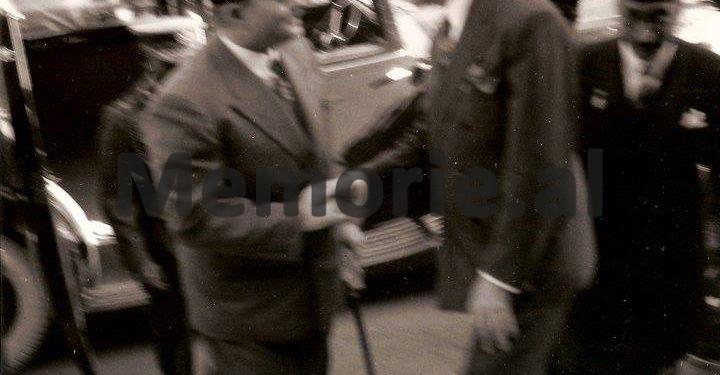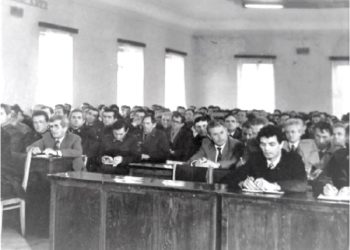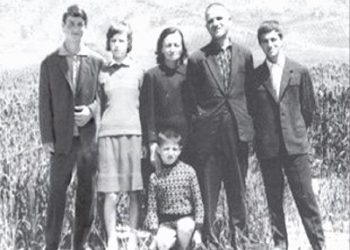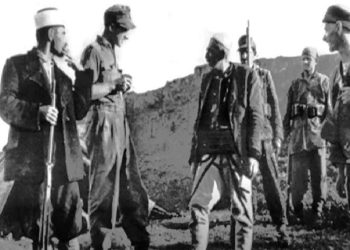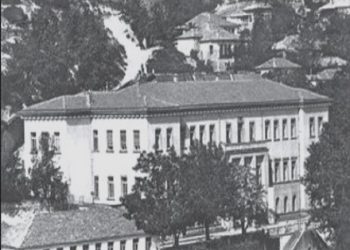By Prof. Dr. Muhammad Mufaku
Memorie.al / The personality of Salih Mufti (1891-1978) summarizes two figures that were formed in the historical developments of the time, namely as Hoxhë Salih Muftia, who became the director of the New Madrasa in Shkodër and as the Mufti of Shkodra (1931 -1939), and as a patriot during the fascist occupation and anti-communist activist in the Albanian exile in the Middle East (1947-1965) and in the United States of America in the period of 1965-1978.
Salih Muftia was born in Shkodër to a well-known religious family, where he completed his Madrasah and later went to Vlora to acquire more knowledge. With the reform of education after the stability of Albania in 1920, the New Medreseja e Re was founded in Shkodër, with a busy secular-religious program led by Salih Myftia, which became an important educational center, as the director was Salih Myftia, which attracted well-known clergymen there.
In 1931, he was appointed chief mufti of the area of Shkodra and Kosovo (which included Kuksi, Hasi, Kruma and Tropoja) until 1939. With the invasion of Albania on April 7, 1939, the patriotic figure of Salih Muftia appeared, after he was arrested as an opponent and was exiled to the Castle of Gjirokastra. As a result, Salih Muftia became a patriotic figure, appealing and organizing the anti-fascist resistance. In this context, Salih Muftia took part in the founding of the “Lëvizja e Legalitet” party headed by Abaz Kupin, on November 21, 1943, where he will remain a prominent figure until his death.
Vision of King Bird
In the autumn of 1944, with the appearance of the danger of communist rule, Salih Muftia, like many other patriots, was forced to leave the country, passing to Italy, which was then under the control of the Anglo-American allies. At first, he was temporarily placed in the Grumo camp in Bari, and later moved to the Reggio-Emilia camp, where many personalities, politicians and Albanian soldiers gathered, spending two years there until 1947.
At that time there was a turning point in the Albanian emigration, with the passage of King Ahmet Zogu from London, where he lived as a private person at his own expense, to Cairo, where he was treated as a legitimate King and was given the Albanian Embassy before the war. , which Cairo has, quickly became the center of the regrouping of emigrants and the organization of the Albanian anti-communist resistance in the region.
What is the truth, the USA and Great Britain ignored Ahmet Zogu during World War II, because of their commitments to Greece and the Soviet Union. Thus, London refused to accept Zogu as King in exile, like others in Central Europe, and even conditioned his stay in London, as a private person, with the disallowance of any political activities or statements. However, with the beginning of the Cold War in 1946 and the outbreak of the civil war in Greece (1946-1949), King Ahmet Zogu foresaw the changes that would follow in the region and saw the rescue of the political-military elite from the camps refugees in Italy, where they lived in cruel conditions, using his friendship with Arab statesmen (Egyptian King Farouk, Jordanian King Abdulla, Syrian President Shukri al-Quwatli, etc.) to accept these refugees in their countries. These citizens expressed their welcome and willingness to provide them with financial aid, even King Farouk offered a ship to transport the Albanians from Italy to the gates of Arab countries. What is the truth, this initiative was part of a far-sighted vision of Zog, according to which he, by bringing the Albanian political elite to the Arab countries and, with their help, could prepare for the liberation of Albania from the communist regime as evidenced by Queen Geraldine, who was present in many of Zog’s conversations with Albanian leaders and Arab statesmen.
For this mission, King Zogu sent his chief adjutant, Hysen Selmani, to Italy in the summer of 1947, to meet with the Albanian political-military elite in the refugee camps, with the aim of forming a National Committee from all parties. , which would deal with the organization of sending Albanian refugees to Arab countries, but became the de facto core of the Political Committee (Free Albania), which will be formed in 1949. Thus, in these meetings with the representatives of political parties in the refugee camps, Salih Myftia is presented to us, as a representative of the ‘Legality Movement’ party in the meeting held in the Reggio – Emila camp, on September 7, 1947, with Colonel Hysen Selman, in which was attended by about 100 people, and on September 17, 1947, a meeting was held to approve the members of the “Committee of refugees”, which according to the words of Hiqmet Devina in this meeting “took the role of a political committee, to bring together all the contributions and sacrifices for the sake of the high interests of the homeland”. At the head of this committee was Mitat Frashëri (with the proposal of Zogu), and as members, following: Salih Myftia, Ernest Koliqi, Ali Këlcyra, Koço Muka, Dr. Qemal Jusufati, Rakip Frashëri and Vasil Andoni.
Back in Alexandria, which became the headquarters of the Royal Palace, Hysen Selmani informed the King about the formation of the Committee for refugees and it was decided to start the action with their arrival. Thus, on October 22, 1947, the members of the committee headed by Salih Muftina arrived by ship in Alexandria, after Mit’hat Frashëri did not come, due to objective reasons. After meeting with King Zog, the members of the Committee led by Salih Mufti, went to Syria, where they met with the President of the Republic, Shukri al-Quwatli. According to Hysen Selman, the members of the Committee “were satisfied with what we heard from the chairman, but they were not satisfied with the behavior of the authorities”, because the refugees who arrived in Damascus did not feel well, because they were not provided with work there, although there were engineers, professors and agronomists, etc., among them.
Meetings with the “Kosovar Group”
Here it is worth mentioning that during his stay in the refugee camps in Italy, Hysen Selmani also met the leaders of the ‘Kosovar Group’ led by Xhafer Deva, Xhelal Mitrovica and Tahir Zajmi, as well as Salih Myfti, as a representative of Legality. When the members of the Refugee Committee went to Damascus, led by Salih Mufti, in October 1947 and their meeting with the Syrian president, Shukri al-Quwatli, Salih Mufti was accredited to present to the Syrian authorities a list of the names of the refugees. Albanians who wish to come to Syria and obtain travel documents that are accepted by the Syrian authorities. Thus, during his stay in Damascus, the heads of the ‘Kosovar Group’: Xhafer Deva, Rexhep Krasniqi and Tahir Zaimi, who published the newspaper “Bashkimi i Kombit” at the beginning of 1948, came this way.
As can be seen from the sources, Salih Muftia had stayed in Damascus for a while, to bring more Albanian refugees from the Italian camps. With the authority he now had, he submitted to the Syrian interior minister a list of names of those who wished to come to Syria, requesting that they be provided with travel documents acceptable to the Syrian authorities. Thus, in a request that we have at our disposal, Salih Muftia presented a list of about 100 figures of the Albanian civilian and military elite who wanted to come to Syria, with a note in pure Arabic with his own hand, which begged the minister that: “these undersigned on the list, to speed up the issuance of travel documents, because they need them the most”, signing it as “The Mufti of Albania”. He remained for a while in Damascus, to convey the situation of the Albanian refugees there. According to the memoirs of his son, Dr. Fuad Muftia, who accompanied him in Damascus, he already had good relations with the Syrian president, Shukri al-Quwatli.
Thus, he describes the plight of the Albanian refugees who enjoyed some help from the government, but says that the Syrian government did not have enough means for which “promises were not fulfilled in some cases”. However, due to his connection with the Syrian president, he had the authority to send Albanian refugees in Italy and Greece travel documents that were accepted in Syria, according to the agreement with the Syrian authorities. Thus, in November 1947, a letter from Salih Muftia in Damascus arrived at the Royal Palace in Alexandria, where it shows that Colonel Fiqri Dine was presented by Greece with a request to come to Syria with 700 Albanian refugees from Greece, and asks: “A should we send them travel documents that the local authorities here accept, or ask them not to come based on previous orders?”.
The answer was negative, that is, for postponing their arrival, because King Zog with a prophecy saw that the region was getting into tensions as a result of the clashes between Arabs and Jews in Palestine, because with the arrival of Palestinian refugees in Amman and Damascus, the authorities local authorities were no longer able to fulfill their promises to the Albanian refugees. Therefore, King Zog began to consult with the International Refugee Organization (I.R.O.), founded in 1947, for the transportation of Albanian refugees from the Middle East to other countries, such as the USA, Canada and Australia.
The situation of Albanian refugees in Damascus
However, over time, the situation of Albanian refugees in Damascus worsened with the arrival of Palestinian refugees and the lack of Syrian government financial resources for them. Thus, on January 15, 1948, a letter came to the Royal Palace in Alexandria from Salih Muftia, on behalf of the Committee for Refugees from Damascus, in which he complains about the situation there: “Now more than 2000 Palestinian refugees came to Syria and they do not know what they offer us. We have 500 Albanian refugees in serious condition. His Excellency, President Shukri al-Quwatli spares no interest in us, but they no longer have funds in the budget to spend. Please do something urgently.” As a result, King Zog met that day with Mr. Peterson, responsible for refugees in Europe at the I.R.O. who pledged to provide Albanian refugees with shelter in New Zealand, Australia, Canada, etc.
During his stay in Damascus, 1947-1948, Salih Muftia also had political responsibilities, as one of the leaders of the Legality party. Among the Albanian refugees in Damascus, there were three main parties: ‘Legalitetit’, ‘Balli Kombëtar’ and ‘Kosovar Group’. Apart from the ‘Kosovar Group’, which had the leadership in Damascus (Xhafer Deva, Rexhep Krasniqi, Tahir Zajmi), the ‘Legality Movement’ party had a good presence. A photo from that time, we have “the group of the ‘Legality’ Branch in Damascus”, a total of 26 men and women.
After the I.R.O. managed to transport most of the Albanian refugees from Damascus and settle them in other countries (New Zealand, Australia, Canada and the USA), Salih Muftia returned to Alexandria, where he continued to serve as an adviser to the King Zog and as members of the Royal Council, together with: Mehdi Frashëri, Hiqmet Delvina, Musa Juka, Mustafa Kruje, Hysen Selmani, Qemal Mesareja, Omer Beqiri, Ago Agaji and Bajazi Boletini. The Royal Council was formed after King Zog settled in Alexandria and met from time to time to review national events.
Reconciliation of Albanian political leaders in exile
In this context, the attitude of Mr. Salih Muftia in Alexandria in the following years (1948-1955) were important for that historical moment: the reconciliation of the Albanian political leaders in exile to form a political committee (instead of the government in exile), which would represent the Albanians in the new circumstances of the Cold War. The only one who mentioned in passing Salih Muftia’s contribution to this great initiative was Zef Pashku, in his speech on the occasion of Sali Muftia’s death. Thus, showing his merits, he said that: “in exile, he was among King Zog’s closest advisers and the person who helped him more in realizing the connection between King Zog and the leaders of the Albanian political exile, known as “Agreement of Alexandria”.
In fact, the Protocol or Agreement of Alexandria, on August 12, 1948, was an important turning point, since the Albanian anti-communist political-military opposition was crushed in 1944-1945 and divided into several political parties in the refugee camps in Italy, Greece, Turkey, etc. At that time (1947), Salih Muftia served as a representative of the ‘Legaliteti’ party (in the Reggio – Emilia camp in Italy) and with the authority he had among the Albanian political-military elite, he managed to bring the parties together and Albanian political groups to accept King Zog’s invitation to meet in Alexandria in August 1948. In this meeting, the representatives of four parties met (‘Legaliteti’, ‘Bali Kombëtar’, ‘Bloku Kombëtar Independent’ and ‘Grupi Kosovar’). After many meetings, the “Covenant” was reached and announced on August 12, 1948, which paved the way for the establishment of the Albanian Committee “Free Albania” in 1949, with a political wing headed by Mit’hat Frashër and a military wing in led by Abaz Kupin, who was involved in the recruitment and training of Albanian volunteers and their deployment in Albania during the years 1950-1951, with the help of the American and British secret services.
Because of this, Salih Muftia enjoyed such authority in the Royal Palace in Alexandria, namely in the Royal family, that the grandson of King Zog, Skender Zogu, calls him in his memoirs: “The legendary Mufti”. In those years, Salih Muftia served as King Zog’s advisor for relations with the Egyptian circle, and especially with the Muslim religious circle. Thus, in February 1950, King Zog visited Az-har with Salih Mufti, where the Shehu of Az-har was waiting at the head of the staff, who greeted the King with one word, focusing on “fraternal relations between the Albanian people and to the Muslim peoples in the East”. After these words, the King walked through the University, where there were also Albanian students and the Islamic Museum, and at the end he received a high level of gratitude. Undoubtedly, the presence of Salih Mufti with his religious authority served good at promoting Bird in the Middle East as a legitimate King fighting to free his country from communist rule.
The failure of the “Great Operation” in Albania
However, Zog’s ambitions were curtailed in 1951, with the failure of the “Great Operation” in Albania, and in 1952, with the military coup against King Farouk, who provided all possible assistance to King Zog during the 1946 -1952. With the suppression of the Kingdom in Egypt in June 1953, the new Egyptian authorities decided to close the Royal Albanian Embassy in August 1953. With the arrival of Colonel Gamal Abdulnaser at the head of power, pressures began against King Zog, including a concerted campaign in the press against The king, who was in a financial crisis because he was covering the expenses of the Albanian elite who had remained there, until he left Aleksandeia, on July 28, 1955, for France, together with his spear.
After the departure of King Zog, several Albanian figures remained in Alexandria, among who were Salih Muftia, but now in new conditions, since the new Egyptian regime recognized the People’s Republic of Albania, headed by Enver Hoxha. According to the memoirs of the son Fuad Myftia, who in 1958 left for the USA, with the consent of his father, Salih Myftia, had continued to work as a professor at home, where students came to him for lessons, or in some college, until he himself left for the USA in 1965, where he will continue with his patriotic and religious activity, until his death in 1978./Memorie.al
**Kosovo historian, external member of the Arab Academy in Damascus, founded in 1919.




